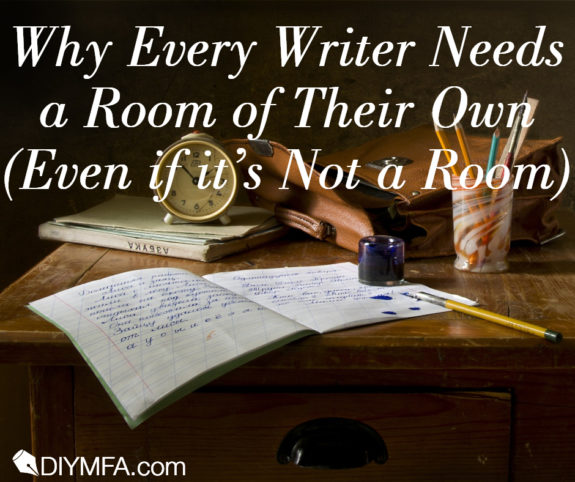Last time on Speculations, we looked at your writing process and possible ways to improve it. This time around, I want to focus on where you ply your craft. It can have more of an impact than you think.
A room of one’s own, literal or metaphorical, is critical to every writer’s success. Just like you need to be aware of your process and how it evolves over time so you can work toward continual improvement, you should also create a space where you can go to engage in your writing practice on a regular basis, where you can protect yourself from interruption and honor yourself and your craft.
The Literal Thing
If you have the space and the finances to support it, you can have your own writing room. I call mine my office, and it has a door that I can close, lots of bookshelves full of books, a lovely wooden filing cabinet I bought from a friend, an adjustable desk, and a reading nook with a papasan chair (that’s really a pup-asan chair because my dog, Torvi, uses it more than I do). It also has some personal touches: plants, a little sacred space, and a lot of memorabilia I’ve gathered over the years. And candles. It really is a small room. I just maximize and multi-purpose the space.
You might be a little more spartan in your tastes. The great thing is that, with a room of your own, you can do what you want with it. As long as it fosters your creativity and your process and doesn’t serve as a distraction.
Roz Morris offered a virtual tour of her writing room. This past January, Jared A. Brock posted more than a hundred pictures of authors in their writing rooms for The Writing Cooperative. Google “writing rooms” and you’ll find a lot of inspiration. And there’s always Pinterest.
Your own room in your own house or apartment isn’t your only option, though. You can rent studio space like Dan Blank. There are a lot of creative collectives that exist to provide this kind of service at a reasonable cost. Or, if go big or go home is your style, you can build yourself a writing shed like Chuck Wendig.
The Metaphorical Thing
Sometimes, having your own room isn’t an option. But you can look at what space you have available and work with that. Over the years, I’ve had a corner in the bedroom, or the living room, and one time, I even took over the front entry (it was a very small desk). Some writers I know have converted their closets into offices.
If you only have a part of a room as your writing space, you’ll have boundaries instead of doors. Announce to your family or roommates that when you’re sitting at your desk, you’re not to be disturbed. Invest in a good pair of noise cancelling headphones and shut out the rest of the world. Whether you listen to music or not is up to you and your preferred process.
Some writers don’t need a specific room or space at all, but just an old laptop with no access to the internet that can be used in any room. Other writers, like George R.R. Martin, use old, but perfectly serviceable versions of word processing software for similar reasons (minimal distraction).
Others go to the public library—many have rooms that can be reserved by patrons for no cost. But the common areas are often quiet enough that you can focus on your work and research is right at hand. Librarians are a writer’s best friends. Cultivate them. A café can be a good option as well, but you have to be mindful of the fact that your writing space is also someone else’s business. Be prepared to buy a few cups and/or tip generously.
The Periodic Thing
There may be times when your usual accommodations aren’t enough, though. If you have a deadline looming or want to participate in an event like National Novel Writing Month, the Three-Day Novel Writing Marathon, or something similar, you might want something more private.
Maybe you have access to a cabin or cottage of a friend or family member. You could also rent one in the off-season for a reduced cost or try a hostel.
Author and storyteller Marie Bilodeau takes affordable accommodations at a nearby convent. The rooms are guaranteed to be distraction free and the grounds are intended for peaceful contemplation. You may be surprised at what unique and inspiring options you can find in your area.
Finally, you could seek a house sitting gig. Or, if you like it, several. Matt Hughes spends half the year in Europe and half in Canada that way.
Circling Back to the Why
I said at the outset that having your own writing space, literal or metaphorical, was vital to your success as a writer, that it enables you to honor yourself and your craft. I said that it worked hand in hand with your process. Well, not in those exact words, but it does.
Once you understand your process, you need a place to practice. You may not write every day—and you don’t have to—but you need a place where you feel at home, safe, and inspired, so that when you’re ready to head to the page, the page is ready and waiting for you.
That’s what having a room of one’s own is all about. If you’re a writer, you write, not because you have to, but because you love it so much it’s impossible not to. You need a place to welcome you home and welcome your words. You need a space in which you can honor this part of who you are.
Give yourself the gift of a writer’s space this year and if you already have one (yay!), maybe it’s time to revisit it, make it even more special, because, just like your process, the place you create in is going to evolve. Change is good. It means you’re growing and developing and becoming the writer you were always meant to be.
Until next time, keep speculating and see where it leads you!
 Melanie Marttila creates worlds from whole cloth. She’s a dreamsinger, an ink alchemist, and an unabashed learning mutt. Her speculative short fiction has appeared in Bastion Science Fiction Magazine, On Spec Magazine, and Sudbury Ink. She lives and writes in Sudbury, Ontario, Canada, where she spends her days working as a corporate trainer. She blogs at https://www.melaniemarttila.ca and you can find her on Facebook and Twitter.
Melanie Marttila creates worlds from whole cloth. She’s a dreamsinger, an ink alchemist, and an unabashed learning mutt. Her speculative short fiction has appeared in Bastion Science Fiction Magazine, On Spec Magazine, and Sudbury Ink. She lives and writes in Sudbury, Ontario, Canada, where she spends her days working as a corporate trainer. She blogs at https://www.melaniemarttila.ca and you can find her on Facebook and Twitter.







